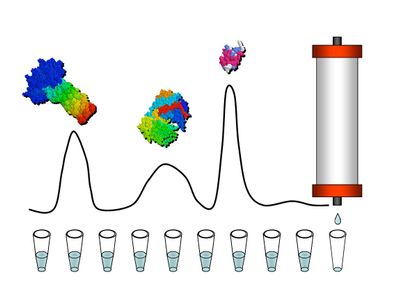Kursen ger en teoretisk och praktisk orientering i de metoder som används för rening av olika biomolekyler (proteiner, nukleinsyror, metaboliter mm). Översiktlig kunskap om huvudstegen i en reningsprocess, från hantering av biologiska prover och sönderdelning av celler, via de vanligaste separationsmetoderna, till koncentrering och förvaring av renat slutprov, ingår. Grundläggande försöksplanering kommer också att behandlas. Kursen innehåller både teoretiska och praktiska moment.
Följande metoder kommer att behandlas i kursen:
- Cellsönderdelning
- Centrifugering
- Filtrering
- Fällning
- Kromatografi (gel-filtrering, jonbyte, hydrofoba interaktioner, affinitet m.fl.)
- Buffertbyte, koncentrering och förvaring
Efter godkänd kurs (Betyg E) skall studenten uppvisa
Kunskap och förståelse genom att kunna:
- Beskriva, förklara och ge exempel på vanliga metoder för rening av biomolekyler (TEN1)
- Tillämpa metoder för rening av biomolekyler (LAB1)
- Utföra ett kromatografiskt experiment för rening av en biomolekyl, beräkna utbyte för reningen samt föreslå förbättringar (LAB1)
Färdighet och förmåga genom att:
- Planera en effektiv reningsprocess för en biomolekyl (LAB1)
- Rapportera muntligt och skriftligt inom ämnet (LAB1)
Värdering och förhållningssätt genom att:
- Kritiskt granska en presentation av ett experiment och ge konstruktiv återkoppling
För högre betyg (A – D) ska studenten även kunna:
- Jämföra metoder och planera komplexa experiment för rening av biomolekyler (TEN1)
